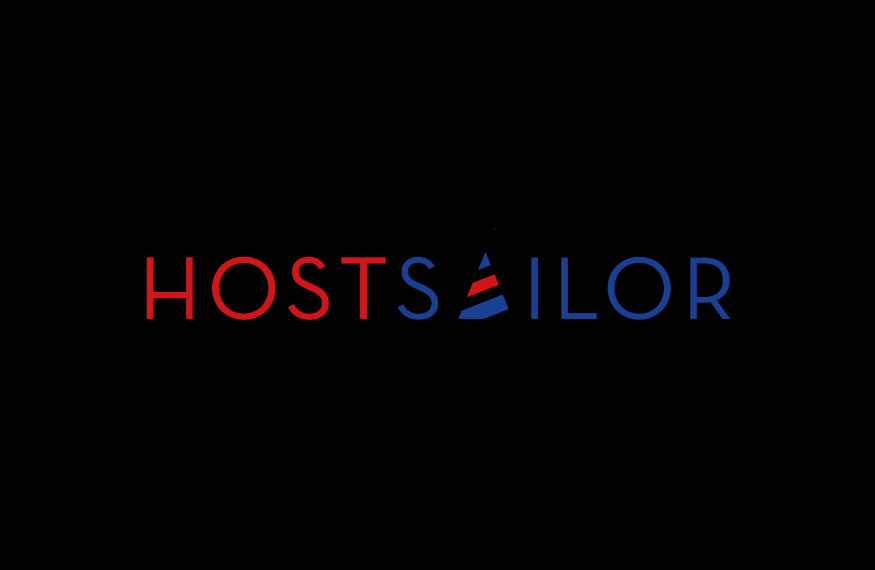
HostSailor is a well established Low End provider. They joined Low End Talk over eight years ago in April 2014. As of this writing, HostSailor has started 85 Low End Talk discussions and commented 355 times. HostSailor has been thanked 183 times.
HostSailor provides many kinds of services, including domain registration, web hosting, virtual and dedicated servers, colocation, domain names, and SSL certificates. They accept many payment options, including crypto currency. HostSailor has reseller programs for web hosting and for virtual servers. HostSailor offers 24/7 tech support.
HostSailor offers dedicated servers in Romania and in the Netherlands. The HostSailor Netherlands Servers include servers from the Fujitsu Primergy line.
HostSailor asked Low End Box to review one of their Netherlands Primergy servers. Account credit of $300 was provided to cover the costs of buying the server for the review.
Selecting The Server
Here is a screenshot of the HostSailor Fujitsu Primergy Server page.
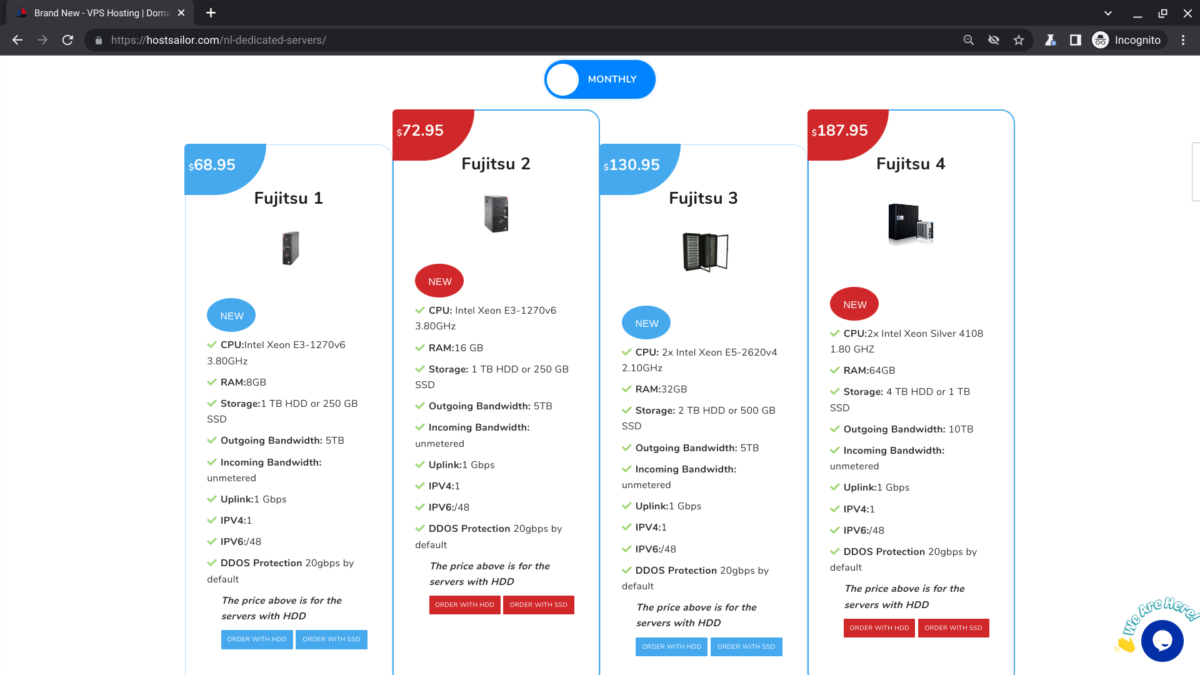
The Fujitsu 3 was selected for the review. Note that HostSailor Fujitsu servers are presented and priced with one disk. Many customers might want at least two disks and RAID so that failure of a single disk would not bring the server down. The type of disk, SSD or HDD, was among the configurable options, but the number of disks was not among the configurable options. Therefore, customers who want more than one disk presumably would need to contact HostSailor sales prior to ordering. However, for our testing, one disk seemed sufficient, because no important data would be kept on the test server.
Selecting The Operating System
The Operating System options offered are shown in the next screenshot. As we can see, FreeBSD 12 was selected for the original auto-install on our test server.
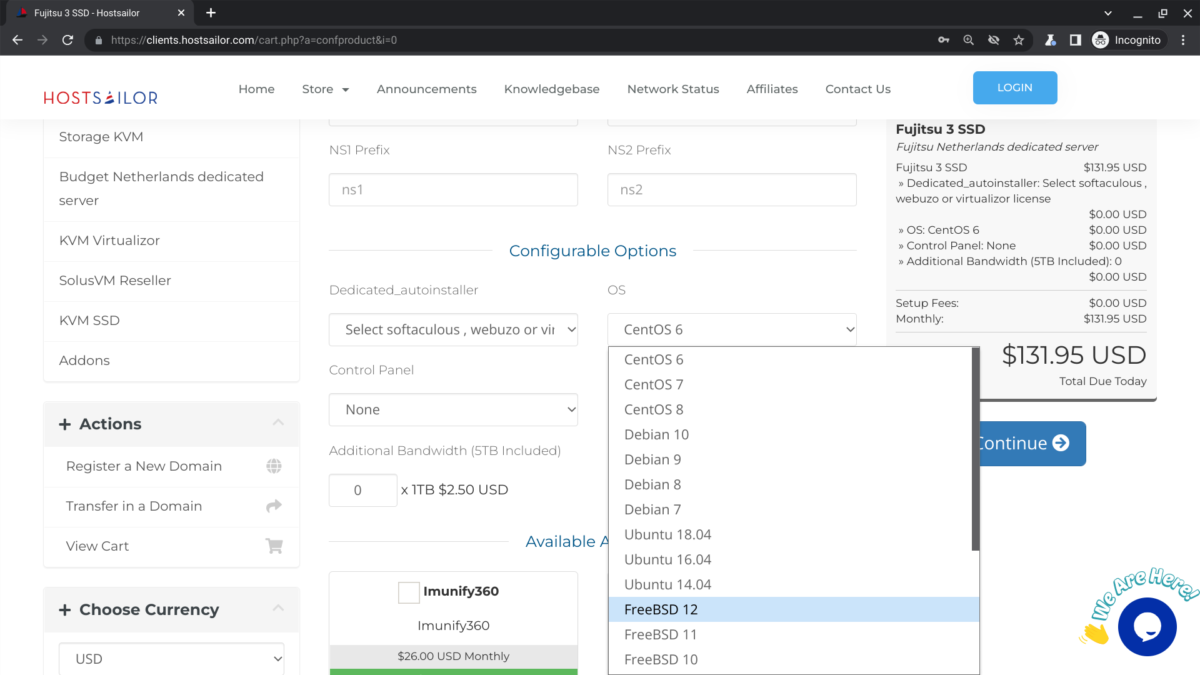
The Operating System auto-install selection might need updating soon. While Debian 10 is still under Long Term Support, Debian 11 was released over a year ago on August 14, 2021. The latest Ubuntu version available by auto-install is 18.04, but Ubuntu releases are at 22.10.
According to this CentOS wiki page, full updates of CentOS 7 ended on August 6, 2020, but maintenance updates (“only Security errata and select mission critical bug fixes”) continue until June 30, 2024. While CentOS 8 is available, neither Rocky Linux nor Alma Linux are offered.
The situation with FreeBSD is similar to Debian. FreeBSD 12 is still supported, but FreeBSD 13 was released over a year ago on April 13, 2021.
Of course, customers have the option of installing Operating Systems using the out-of-band baseboard management module, which on Primergy servers is called the iRMC
Server Delivery Time
Our order was placed on Wednesday, September 19, 2022 at 10:57 PM MST. Both the order and the payment from account credit were confirmed immediately by emails from HostSailor.
The server delivery email was sent on Saturday, September 22, 2022 at 12:56 PM MST. Two minutes later, a second delivery email arrived from HostSailor Support. The second email said, “Since we are facing some issues with FreeBSD auto-install, we have delivered the server with CentOS 7. If you want to use FreeBSD OS, we can provide you with the remote iRMC access and you can mount the ISO and install OS.”
Remote Management Controller
HostSailor Support was helpful in resolving initial issues with the iRMC access. Here is a screenshot of the iRMC Console.
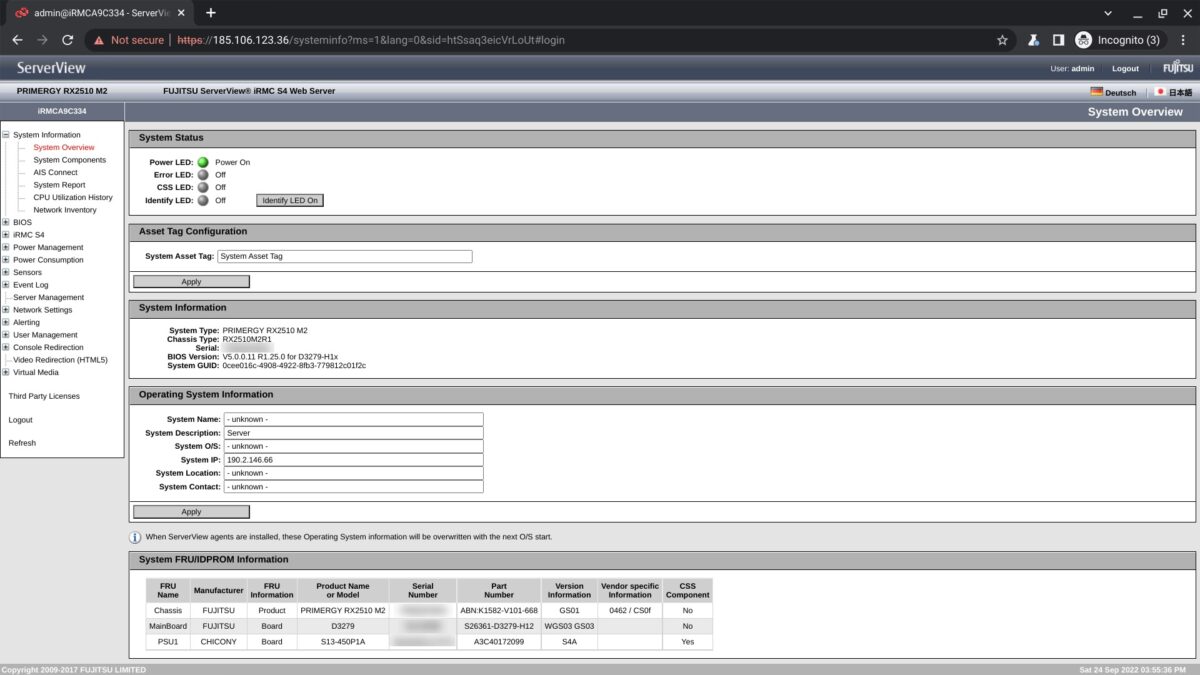
Here are the Java install instructions provided by HostSailor Support:
Login to iRMC using kttps://{Redacted]
Console Redirection –> Video Redirection (JWS)
Mount ISO
From console,
Mount –> Virtual media Wizard –> CD/DVD –> Browse the ISO and connect.Boot the ISO file
From console,
Power –> Set Boot Options
From Boot Device Selector, select the CDROM/DVD. Tick “next boot only” option.
And then from Power –> Immediate reset
HostSailor Support confirmed that they were able to load the FreeBSD.iso with the Java applet. HostSailor Support even was willing to complete the install for me, which was nice. But, nevertheless, I wanted to try some more myself. Since I use a Chromebook, on which Java isn’t easy, I elected to try the iRMC’s HTML5 console video redirection. Unfortunately, with HTML5, the install .iso started uploading and then appeared to freeze. In this screenshot, you can see that the .iso upload appeared to stop at 283 KB. The full .iso is 367 MB.
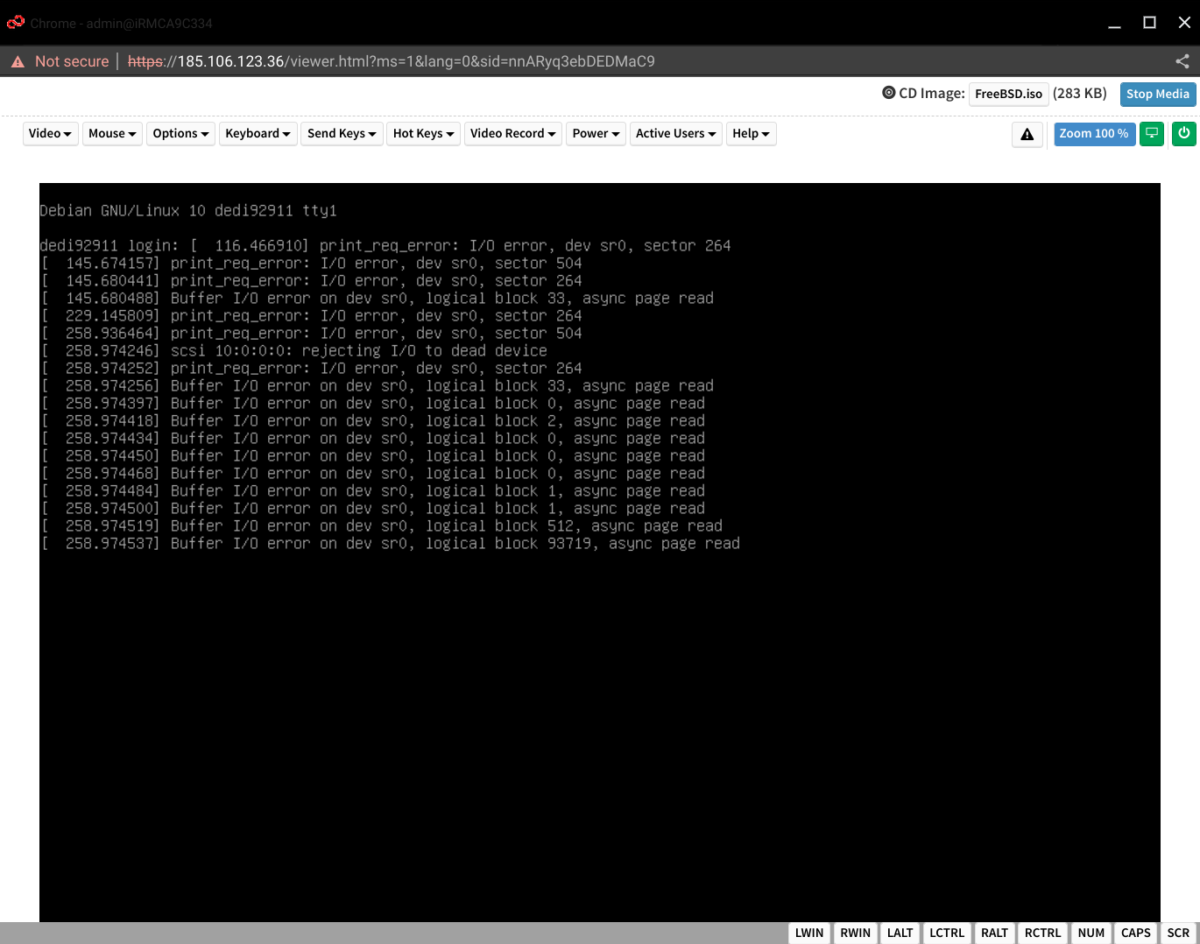
I also tried the HTML5 iRMC interface with a second, different machine, a different network, and a different browser, Firefox instead of Chrome. Firefox opened the iRMC and also the redirect console. But then the redirect console’s Firefox tab crashed.
It may be that the best route to remote installation on this server is to use the Java interface. Alternatively, further work on the HTML5 interface might prove successful. I can imagine that using Windows and Internet Explorer might work with the HTML5 interface.
Last, but not least, running user mode Qemu-KVM on an auto-installed Linux OS would allow installation of any of the BSDs. Other Linux distributions and other OSes not offered by the auto-installer also could be installed via Qemu-KVM. Newer versions of the distributions available in the auto-installer could be installed via Qemu-KVM. Thus, even though the HTML5 interface didn’t work for me the first time, it’s highly likely that almost any OS that is hardware compatible with this server could be installed.
Server Benchmark
The server has two Intel Xeon E5-2620 v4 CPUs. The launch date for these 2.10GHz 14mm CPUs was Q1’16. The server has ECC memory because the width of the memory modules is shown as 72 bits in the output of dmidecode.
Here is the Low End obligatory Yabs.
[root@dedi92911 ~]# curl -sL yabs.sh | bash
# ## ## ## ## ## ## ## ## ## ## ## ## ## ## ## ## ## #
# Yet-Another-Bench-Script #
# v2022-08-20 #
# https://github.com/masonr/yet-another-bench-script #
# ## ## ## ## ## ## ## ## ## ## ## ## ## ## ## ## ## #
Sat Sep 24 01:06:13 CEST 2022
Basic System Information:
---------------------------------
Uptime : 0 days, 1 hours, 40 minutes
Processor : Intel(R) Xeon(R) CPU E5-2620 v4 @ 2.10GHz
CPU cores : 32 @ 1200.347 MHz
AES-NI : ✔ Enabled
VM-x/AMD-V : ✔ Enabled
RAM : 31.1 GiB
Swap : 2.0 GiB
Disk : 463.5 GiB
Distro : CentOS Linux 7 (Core)
Kernel : 3.10.0-1160.76.1.el7.x86_64
fio Disk Speed Tests (Mixed R/W 50/50):
---------------------------------
Block Size | 4k (IOPS) | 64k (IOPS)
------ | --- ---- | ---- ----
Read | 178.74 MB/s (44.6k) | 241.66 MB/s (3.7k)
Write | 179.21 MB/s (44.8k) | 242.94 MB/s (3.7k)
Total | 357.96 MB/s (89.4k) | 484.61 MB/s (7.5k)
| |
Block Size | 512k (IOPS) | 1m (IOPS)
------ | --- ---- | ---- ----
Read | 257.16 MB/s (502) | 257.36 MB/s (251)
Write | 270.82 MB/s (528) | 274.50 MB/s (268)
Total | 527.98 MB/s (1.0k) | 531.86 MB/s (519)
iperf3 Network Speed Tests (IPv4):
---------------------------------
Provider | Location (Link) | Send Speed | Recv Speed
| | |
Clouvider | London, UK (10G) | 939 Mbits/sec | 940 Mbits/sec
Online.net | Paris, FR (10G) | 937 Mbits/sec | 937 Mbits/sec
Hybula | The Netherlands (40G) | 942 Mbits/sec | 941 Mbits/sec
Uztelecom | Tashkent, UZ (10G) | 884 Mbits/sec | 892 Mbits/sec
Clouvider | NYC, NY, US (10G) | 891 Mbits/sec | 899 Mbits/sec
Clouvider | Dallas, TX, US (10G) | 860 Mbits/sec | 870 Mbits/sec
Clouvider | Los Angeles, CA, US (10G) | 842 Mbits/sec | 853 Mbits/sec
iperf3 Network Speed Tests (IPv6):
---------------------------------
Provider | Location (Link) | Send Speed | Recv Speed
| | |
Clouvider | London, UK (10G) | 927 Mbits/sec | 927 Mbits/sec
Online.net | Paris, FR (10G) | 925 Mbits/sec | 925 Mbits/sec
Hybula | The Netherlands (40G) | 925 Mbits/sec | 926 Mbits/sec
Uztelecom | Tashkent, UZ (10G) | 875 Mbits/sec | busy
Clouvider | NYC, NY, US (10G) | 884 Mbits/sec | 891 Mbits/sec
Clouvider | Dallas, TX, US (10G) | 848 Mbits/sec | 858 Mbits/sec
Clouvider | Los Angeles, CA, US (10G) | 831 Mbits/sec | 844 Mbits/sec
Geekbench 5 Benchmark Test:
---------------------------------
Test | Value
|
Single Core | 741
Multi Core | 8987
Full Test | https://browser.geekbench.com/v5/cpu/17500557
[root@dedi92911 ~]#Good Network
This server is located in the Greenhouse Data Center in the Netherlands. The server is within HostSailor’s AS60017. Some of the network peers frequently are seen within the Low End world. Low End or not, the really lovely network send and receive speeds in the above Yabs might be one of the best features of this server!
Good Uptime
Server uptime has been really good! I haven’t noticed any issues, disregarding one during the time we were working on getting the iRMC configured.
Fast Support
HostSailor offers 24/7 support. Replies have been prompt and helpful no matter what day or time I initiate a support ticket or add to an existing ticket.
Conclusion
It is possible to find European servers similar to this test server for slightly lower prices. It is difficult to find equally good networking and equally good support. This server is worthy of consideration, even by Low Enders, especially because of the good network, good uptime, and fast support.
Offer Link
Here is the offer link to get these Netherlands servers.























Leave a Reply